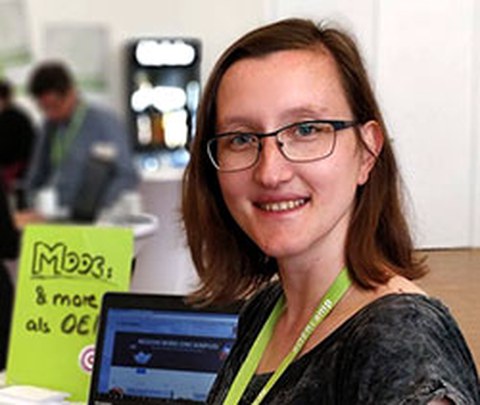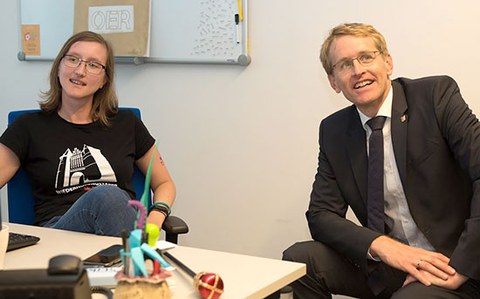Queen of Online Courses
(Interviewed in 2020)
Dagmar Möbius
Back in her school days, Anja Lorenz regularly participated in Mathematical Olympiads and took a great interest in computers. She loved computer games and 3D animated movies and was always one of the few girls in her computer science classes. She hoped that one day she could pursue a career in this area, too. Originally from Saxony-Anhalt, Anja Lorenz earned her Diplom in Media Computer Science from TU Dresden and is now a member of academic staff at Technische Hochschule Lübeck – a university of applied sciences in northern Germany. She is also known as the Queen of MOOC-Maker. She is also essentially a living witness to how learning culture has changed over time.

Anja Lorenz at OERCamp18Nord.
Anja Lorenz delights in being introduced as the Queen of MOOC-Maker at conferences. She even carries this title on her business cards and in her email signature. However, this is not the 36-year-old’s official job title. Since 2014, the Queen of MOOC-Maker has worked as an Instructional Designer at Technische Hochschule Lübeck’s Institute for Interactive Systems. Additionally, Lorenz is committed to open education and research.
Her royal title was bestowed after joking around her team. “We were poking fun at some common English job titles. Somehow it just stuck,” laughs Anja Lorenz. MOOC stands for Massive Open Online Course – an open access online course available to everyone with no limit on the number of participants. More and more institutions of higher education are turning to this form of education. “TU Dresden too,” said Anja, who studied here from 2003 to 2008. After holding positions at chemmedia AG and five years at the Faculty of Business Information Systems at TU Chemnitz, she also worked as a member of academic staff at TU Dresden’s Media Center from 2012 to 2013 before taking up her current position at TH Lübeck.
Ice Age as a role model
Anything other than her chosen field of Media Computer Science was never an option for Anja Lorenz. “Back then, I couldn’t imagine studying math,” she says. Even ten years after the fall of the Berlin Wall, the teacher was often still learning alongside the students during computer science lessons. When she graduated from high school, Anja Lorenz imagined how exciting it would be to create a movie like Ice Age. However, the hardware side of computer science held little appeal for her. As an eleventh grader, she spent a week in Dresden and snuck into a first-year lecture on Media Computer Science at TUD.
Never the token woman
In retrospect, she is glad she decided to combine her Diplom studies with business administration in her third semester at TU Dresden – even if her interests have changed since then. Anja Lorenz has since become interested in e-learning. ”In my fifth semester at university, I started putting together my own class schedule,” she says. She worked as a student assistant at the Chair of Didactics of Computer Science and visited lectures on collaborative systems, accessible documents and media law. Her Diplom thesis (“Analysis and realization of role management in the collaborative learning environment Blues'n’”) expanded on these topics. “I never felt that being one of the few women in the course singled me out in any way,” she says. Although during her undergraduate studies, she had the impression that over 90 percent of the students were men. “At first, I found it disconcerting that there was an affirmative action program for women,” she says looking back. “I never felt that I needed extra support just because I’m a woman, as this didn’t seem to be an issue in my field of studies. But now I recognize the importance of having female role models. Back then, all of my professors were men.”

In 2018, Anja Lorenz sat down with Schleswig-Holstein’s Minister President, Daniel Günther (CDU), at Technische Hochschule Lübeck to talk about her work.
Contemporary witness of online course developments from beekeeping to volleyball
Lorenz moved to Chemnitz University of Technology in 2009 and had planned to pursue her doctorate there. Many exciting projects emerged relating to the topic of e-learning. “I was involved in the creation of the first German-language MOOCs and created some myself – namely SOOC13 and SOOC1314,” she says. “Both of these were joint projects with TU Dresden’s Media Center.” Thanks to these contacts, Dresden MOOCs also made their way onto the Lübeck platform.
Anja Lorenz did not end up writing a dissertation after all. She found out “you can do other things in higher education.” Online courses had captivated her. In 2014, she delved into the field completely. Technische Hochschule Lübeck has produced around 50 MOOCs to date. “The majority of these are higher education topics,” she says, “and vocational school topics are also up and coming.” In general, the platform covers “everything from beekeeping to volleyball,” also through external MOOC makers.
The Queen of MOOC-Maker does not have a typical workday. She has lots of business trips, usually one every two weeks. She prefers not to come into the office too early. After the “daily load of emails and meetings,” she works on her projects. Right now, she is currently finishing a course on self-protection online. This requires her to speak with experts – something that IT specialists are rarely prepared for during their studies. “Labeling someone as a nerd is no longer in keeping with the times,” Anja Lorenz points out. She does not write code professionally at the moment, but her knowledge of computer science is essential to the work she does with software developers. Not to mention the necessary soft skills. “Solving problems independently or getting a group of people together for collaborative work, choosing the right tools for the job, upholding professional standards, using LaTeX and typesetting properly, and presentation and design skills are what help the most.”
The noble quest: Knowledge, not paywalls
Anja is particularly passionate about OER projects and open access. OER stands for Open Education Resources and refers to openly licensed materials that are made available to others free of charge. “I use these myself and help spread the word,” she explains. Her motivation? “I think it's only fair that government-funded research findings should also be made available to everyone.” Free of charge. Her last publication behind a paywall was in 2017.
In addition to her work at TH Lübeck, Anja Lorenz is a member of BarCamp Lübeck’s organizational team and is on the educamp e.V association board. Since 2018, she has co-hosted the BldgAltEntf podcast with Oliver Tacke, she is a member of the Bündnis Freie Bildung (in English: Alliance for Free Education) and is a supporting member of FabLab Lübeck. Additionally, she is always pleased to be invited to take part in lectures and workshops. She frequently meets former colleagues and her old boss from Dresden at e-learning conferences. If she has free time, she enjoys going to see musicals in Hamburg. She is also passionate about films – especially experimental ones. There is only one thing that Anja Lorenz still has not managed to achieve: “Learning how to do 3D computer animation for films.” Germany does not have any industry in this area, she says. “Maybe I’ll get the chance to pursue this topic later.”
In any case, she hopes that “internet literacy in the academic community will soon eliminate the need for me to keep editing my CV.”
Contact:
Technische Hochschule Lübeck
Anja Lorenz
Twitter: @anjalorenz
